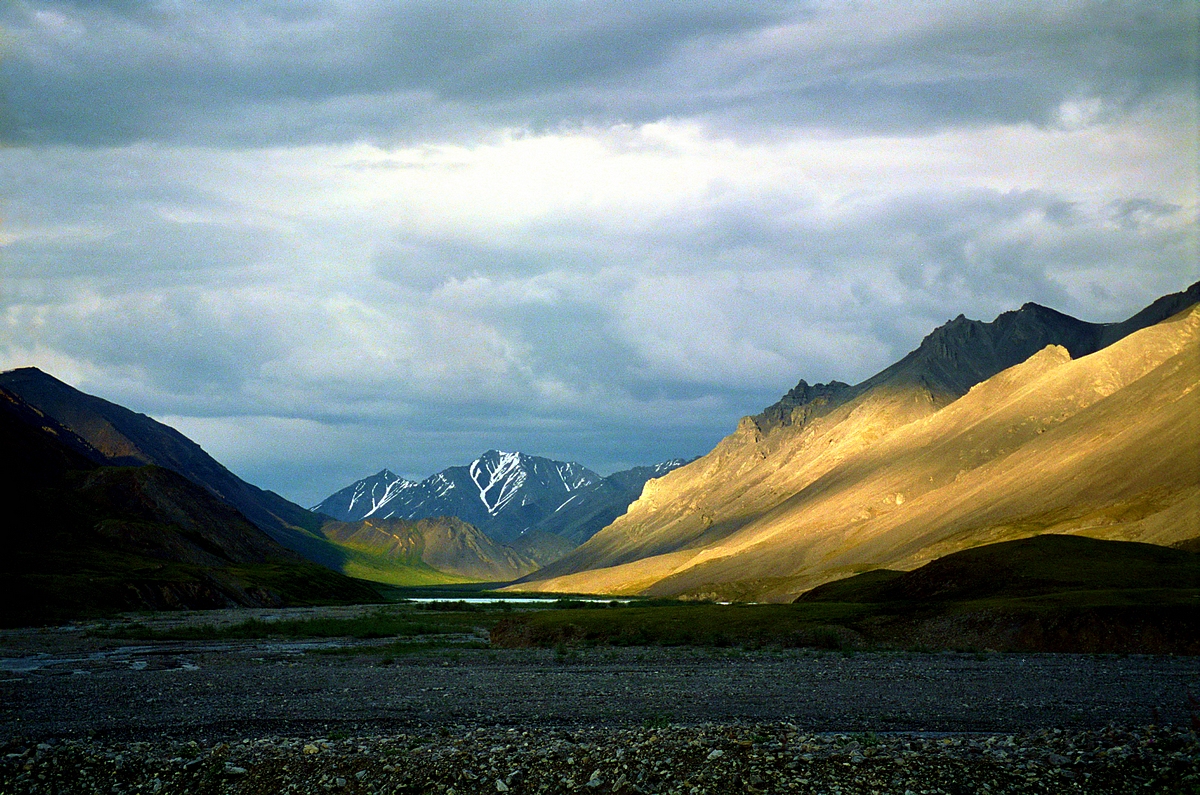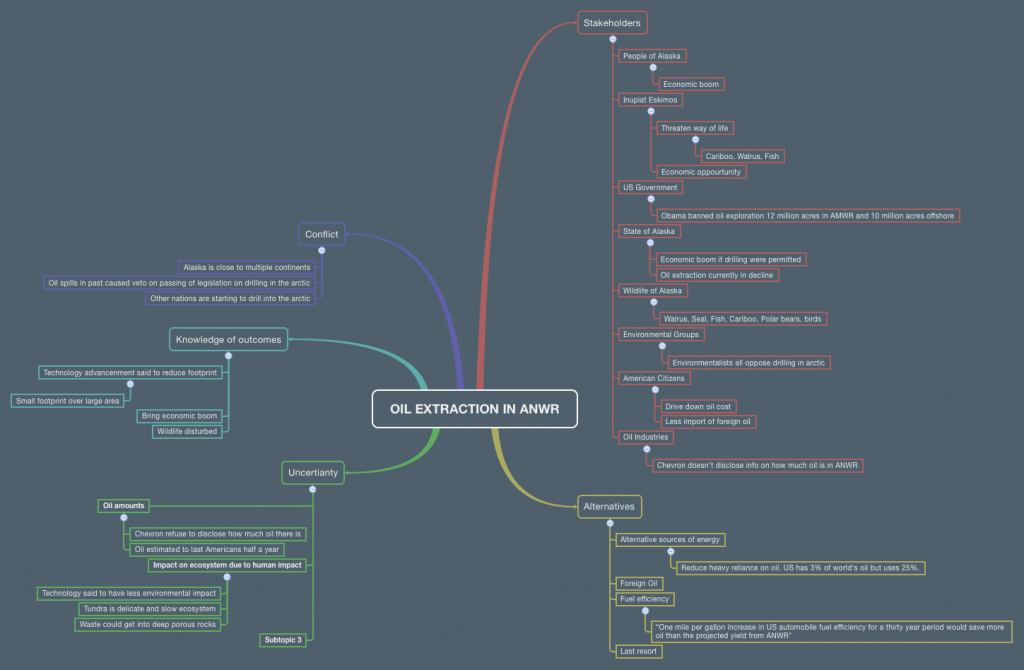The Wicked Problem of Oil Extraction in ANWR
Environment and Sustainability
The Wicked Problem of Oil Extraction in ANWR
Oil exploration in the Arctic National Wildlife Refuge (ANWR) has been a heavily debated controversy since 1977. ANWR is one of the largest untouched places on earth, and the largest wild life reserve in the U.S. This issue has many stakeholders of a wide range of views, debating over the great number of benefits and risks of drilling in the region. This is a wicked problem that is unique due to its geographical location, and unstable due to the tundra’s fragile and slow changing ecosystem.
ANWR itself is very unique. Sitting as one of the last greatest protected wildernesses, it is home to polar bears, seals, wolves, caribou, and birds migrating in the summer. Situated in Alaska, it’s wildlife is a vital part to Iquipat Eskimo way of life. It’s borders actually extend beyond Alaskan borders into Canada. (A. von Hippel)
There is great uncertainty on how much oil is actually found in ANWR. Only one well has been drilled by Chevron, but the well data has been largely closed to the public. Estimates made on seismic data show that Alaska is providing enough oil for the U.S. for only half a year. It is possible that the majority of the oil is actually found offshore underwater. (Bourne) Due to the delicate nature of a tundra ecosystem, this area may be “vulnerable to human disturbances due to short growing seasons and slow life processes.” (A. von Hippel) There is no way of knowing for sure how the wild life would be affected. Although technological advances would reduce the ecological footprint in the area, it may be a small ecological footprint over a large area. Roads would need to be built. Ice roads would require draining water from local lakes, which could kill the fish in them. Gravel roads would need to be built, disrupting the natural landscape. Drilling waste could penetrate deep porous rocks underground. (A. von Hippel) The warming of the frozen ice and ground in the tundra may release trapped carbon and further warm and degrade the ecosystem.
There are many different stakeholders involved in this particular wicked problem. The Mind Map attached lists out the various categories of people affected. There are many benefits and risks involved. Some of the benefits of oil exploration include lowering the price of oil, economic boom, reducing spending on foreign oil, and job creation. (Making) Alaska provides its nation the majority of its oil that isn’t imported from elsewhere. However, in the past few years there has a been a huge decline in oil extraction in Alaska. The alaskan economy is heavily dependent on the oil industry. An economic boom can be seen as majorly beneficial to alaskan residents and natives. (Top) However, some of the risks that come with oil exploration are great. Both animal and human livelihoods may be threatened by this process. We don’t know if there is oil, and if there is, it would only distract people from actually solving the real problem: over consumption of fossil fuels.
There are a number of alternatives, and even the outcome of the alternatives comes with a degree of uncertainty. The first option is continued reliance on foreign oil. Americans currently consume 25% of the world’s oil, while only producing 3%. (Bourne) The U.S. does not have enough oil to sustain it’s current oil use – which brings me to my next point. The second option is to change the way we use oil. “One mile per gallon increase in US automobile fuel efficiency for a thirty year period would save more than the projected yield in ANWR.” (Bourne) It is clear that Americans need reduce oil use. The third option is to use alternative sources of energy like wind, solar, nuclear, and hydro. The final option, is to use ANWR as a “last resort.” Although these could all be viable solutions, there are also complexities and uncertianties regarding the outcome of any of these solutions.
Although there are many different factors in this particular wicked problem, how we decide to solve it may come down how much we value nature versus how much we value oil.
Works Cited
Bourne, Joel Jr. “What Obama’s Drilling Bans Mean for Alaska and the Arctic.” National Geographic. Web. 5 Feb 2015. <http://news.nationalgeographic.com/news/2015/02/150205-obama-alaska-oil-anwr-arctic-offshore-drilling/>
Making The Case For ANWR. n.d. Web. 15 Aug. 2013. <http://anwr.org/2013/08/making-the-case-for-anwr/>
Top 10 Reasons to Support ANWR Development. n.d. Web. 16 Aug. 2013. <http://anwr.org/2013/08/federal-election-day-10-of-the-campaign/>
A. von Hippel, Frank. “Arctic National Wildlife Refuge.” Pollution Issues. n.p., 2015. Web. <http://www.pollutionissues.com/A-Bo/Arctic-National-Wildlife-Refuge.html>
Photo: Jan Reurink <http://arcticjournal.com/oil-minerals/1282/native-groups-not-our-anwr>
Annotated Bibliography
ANWR Drilling: From the American Perspective.
Venegas, Steve. (2008). A Bright Green Light for ANWR Oil. BusinessWeek Online, 27.
(Peer reviewed) Steve Venegas defines three different types of environmentalists to discuss different perspectives on developing oil fields in ANWR. By comparing “truths” and “inconvenient truths”, he reveals misconceptions and propaganda about drilling in the arctic. By surveying 30 people, he found that the most popular opinion was that people wanted drilling as long as the environment was protected. He concludes that with existing technology, it is safe to develop oil fields in ANWR. The article provides insight into various perspectives on oil exploration in the arctic.
Hickel, J. Walter. (2002). ANWR Oil: An Alternative to War Over Oil. The American Enterprise, 13. 54-55.
(Peer Reviewed) Hickel argues that oil exploration in ANWR should be opened up due to environmental and economic reasons. He argues several perspectives. Arctic drilling will cause minimal disturbance due to advanced drilling and seismic technology. Large potential in oil reserves can reduce U.S. dependency on foreign oil. By producing energy nationally, U.S. will be “safer and stronger economically”. Energy alternatives may be pursued in the future. This article is driven to prove that oil exploration is good, and may have served as a form of propaganda.
Lazzari, Salvatore. (2008). Possible Federal Revenue from Oil Development of ANWR and Nearby Areas. Library of Congress. Congressional Research Service. Retrieved from http://www.heinonline.org.ezproxy.library.ubc.ca/HOL/Page?handle=hein.crs/crsagro0001&id=2
(Peer Reviewed) This article analyzes the estimated federal revenue from oil exploration in ANWR. Lazzari discusses potential benefits from drilling in the arctic, that include subsidizing energy costs and reducing federal budget deficits. Currently, oil exploration in ANWR is not allowed by federal law. Potential federal revenue would come from corporate income taxes and royalties. He also discusses costs and limitations to oil exploration to ANWR. Methods retrieving information include data on potential revenue estimations based on several methods. This peer review is useful towards my research on the U.S. perspective of oil exploration in the arctic.
Macalister, Terry. (2015). Shell abandons arctic drilling. Retrieved from http://www.theguardian.com/business/2015/sep/28/shell-ceases-alaska-arctic-drilling-exploratory-well-oil-gas-disappoints
(Grey Literature) In this news article, Shell abandons drilling in the arctic after an unsuccessful summer of oil exploration in the Chukchi Sea. Shell faces losing billions of dollars in abandoning the project. Reasons for abandonment include the oil being too expensive to find and develop. For years, there has been large opposition against oil exploration from environmentalists like Greenpeace. Environmentalists hope that this will discourage other oil companies from oil exploration in the north. This grey literature source was included to discuss the most recent development in arctic oil exploration. It shares the several perspectives of stakeholders. This article reveals that there is not as much oil as some hoped in the arctic.
Harvey, Fiona. (2015). Drilling for arctic oil is not viable yet. Retrieved from http://www.theguardian.com/environment/2015/sep/18/arctic-oil-not-for-today-or-tomorrow-says-iea-chief-fatih-birol

